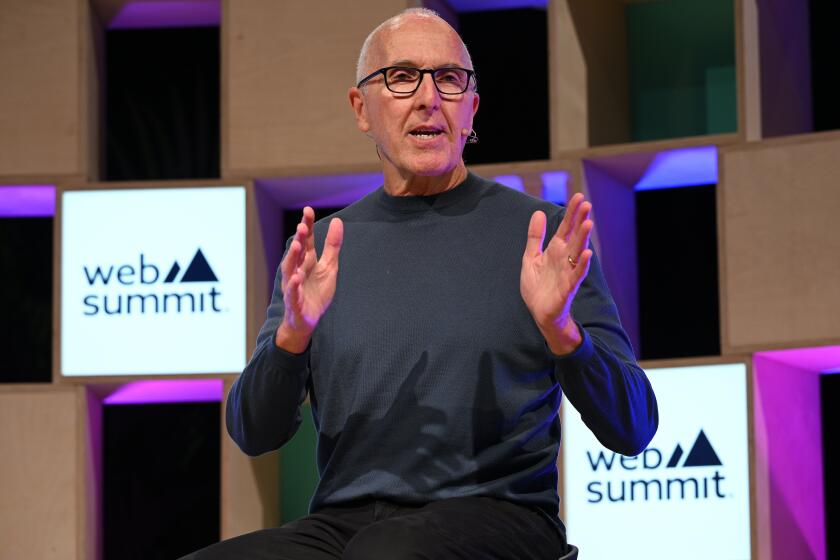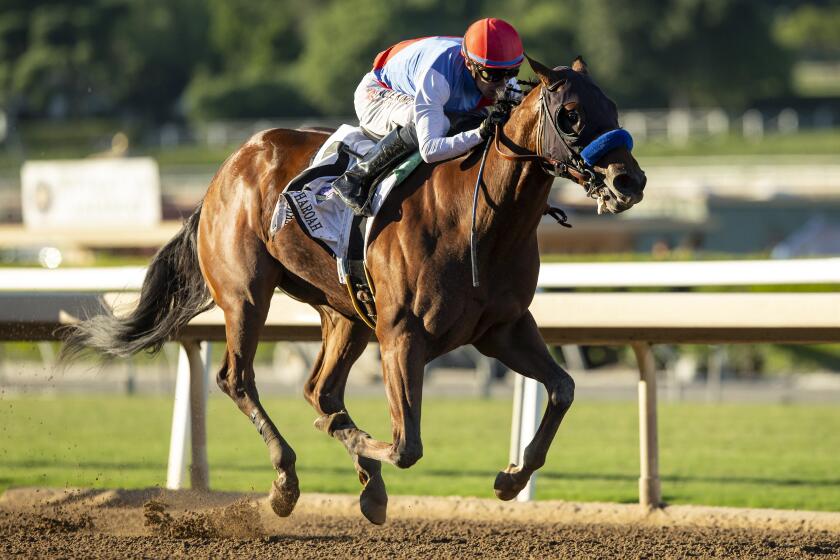She Has Found Peace of Mind on the Greens
It was not too many years ago, she was the brightest light on the women’s tour. Even the name helped. Muffin Spencer-Devlin. No Mary Smith here. A bona fide marquee name. With a hyphen yet.
She was tall, willowy, pretty. She looked like what she had been, wanted to be--a showgirl. She was as uninhibited as a kitten. She wisecracked her way around 18 holes. Reporters loved her. Her competitors were amused by her.
She hit the ball as purely as anyone on the circuit. She had won three tournaments by her fifth full year. The future looked as wide-open as a par-five in west Texas. Muffin was a star.
She hadn’t really set out to be a golf star. A Hollywood star would have been more like it. She didn’t want to be Betsy Rawls, she wanted to be Bette Davis. She didn’t even play golf in college. “I drank beer and partied and popped pills and waited to be ‘discovered,’ ” she says, smiling.
But behind the smiles and antics was a demon she had to cope with and only she knew about--a manic-depressive side to her nature that periodically threatened to take over her life.
Muffin--her real name is Helene--grew up on Long Island and golf had only been a casual thing. Acting was going to be her profession.
She took the name of her father, but hyphenated it with that of a beloved stepfather who indulged Muffin in most of her fantasies, including college in Florida, at Rollins.
Early on, she had manic-depressive episodes, including periodic commitments for treatment and, at one time, had been prescribed lithium carbonate.
She lived with it, but it not only dulled her appreciation of life, it made her feel “as if I were standing on the other side of a screen door watching myself go through the motions. I felt like a zombie.”
She recalls she “put up with this for 13 years. I stayed away from things that were bad--no caffeine, no alcohol, shopped for food in health stores.”
This pretty much kept the balance--until a real estate deal in San Francisco went sour.
“I went into a deep depression. I couldn’t find my way out,” she says.
This time, Prozac was prescribed.
Her game became as erratic as her life. Until, finally, there was a trip to Europe. Muffin’s life became a series of out-of-bounds shots--on and off the course.
She didn’t exactly insult the Queen Mother. She did the next-worst thing, though. She insulted the commissioner of women’s golf in Europe. Muffin chewed him out in language more suited to a truck driver or ferry-boat captain. She got up at a banquet, insulted the guests and proclaimed she was an American and didn’t have to take this. She had slipped into a manic-depressive state.
The next day, she arrived at the first tee of the tournament in England and was told she had been disqualified.
She wanted to fight it but before she could, a concerned friend whisked her to a London clinic, where they recognized her symptoms.
Muffin thought her career was over. She dropped off the tour for five months.
On the face of it, you would have to think the golf tour is the worst place for a manic-depressive. Eight-foot putts can produce manic depression in even the most stable of human beings--mania when sunk and depression when left a foot short. Every shot can produce its own form of mental illness. All athletes live in dread of failure, but golfers can get it every other shot. As Churchill said, the game is played “with implements ill-suited to the purpose.”
And, because the game is so cerebral and depends so explicitly on self-confidence, it would seem the human mind is one of those ill-suited implements. A golf green would seem to be the worst place in the world for anyone who has an uncertain psyche. You’re always a putt away from a straitjacket. You don’t play the game, you serve it.
Yet, Muffin Spencer-Devlin says, simply, “Golf saved my life.” She found, of all things, a serenity of purpose.
For most players, golf is about as serene as a night in Dracula’s castle. But for Muffin, it has had a stabilizing effect.
She’s never going to be Bette Davis--or Betsy Rawls, either. But she has found a regimen of vitamins, amino acids, proper diet and plenty of sleep and regular workouts laid out for her by Dr. Priscilla Slagle, and they have regulated her episodes of disorder. A golf course is the perfect place to be for her--even when the eight-footers come up 18 inches short, Muffin says.
She didn’t win the Nabisco Dinah Shore tournament last week. But she shot a respectable 74-75-72-71--292, outscoring such superstars as Betsy King, Amy Alcott and JoAnne Carner, not to mention last year’s winner, Helen Alfredsson. All in all, a good week for the brand Muffin. And she made $3,029, giving her more than $22,000 for the year to date--a heartening three-month total considering she made only $35,070 all last year.
Golf is the best of all treatments for psychic disability. You not only don’t pay for it, it pays you.
More to Read
Get our high school sports newsletter
Prep Rally is devoted to the SoCal high school sports experience, bringing you scores, stories and a behind-the-scenes look at what makes prep sports so popular.
You may occasionally receive promotional content from the Los Angeles Times.






